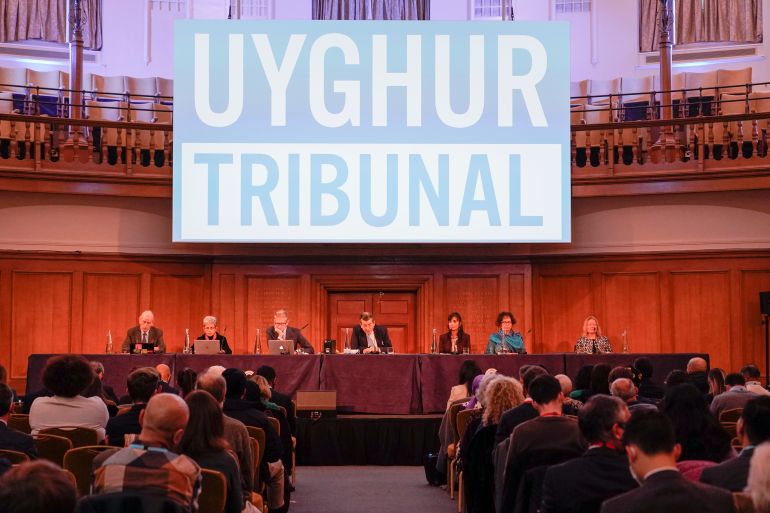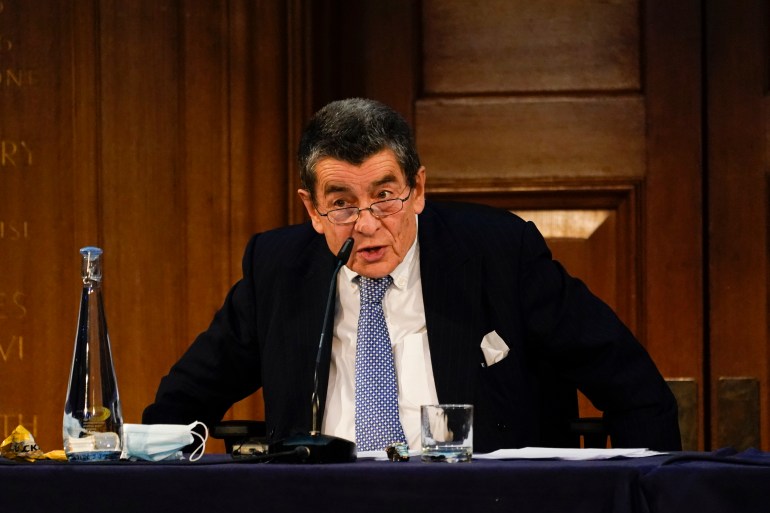China guilty of Uighur genocide in Xinjiang, tribunal rules
The UK-based unofficial tribunal says the Chinese government’s alleged forced birth control of Muslim Uighurs amounts to genocide.

London, United Kingdom – The Chinese government has committed genocide, crimes against humanity and torture against Uighurs and other minorities in its western region of Xinjiang, an unofficial and independent UK-based tribunal has ruled.
Sir Geoffrey Nice QC, the head of the Uighur Tribunal and prominent human rights lawyer, said the Chinese government has targeted the Muslim Uighur population with forced birth control and sterilisation policies in order to reduce the group’s population.
Keep reading
list of 4 itemsUK government urged to hold China ‘to account’ over Uighurs
Turkey’s Erdogan, China’s Xi discuss Uighurs in phone call
Detainee says China has secret jail for Uighurs – in Dubai
“The tribunal is satisfied beyond reasonable doubt that the People’s Republic of China, by the imposition of measures to prevent births intended to destroy a significant part of the Uyghurs in Xinjiang as such, has committed genocide,” said Nice, who also led the prosecution of former Serbian President Slobodan Milosevic on war crimes and genocide.
He added that “this vast apparatus of state repression could not exist if a plan was not authorised at the highest levels”.
The tribunal does not have government backing and the power to sanction or punish China. But experts say that it will help to galvanise governments around the world to hold China accountable for abuses.
The Chinese authorities have arbitrarily detained as many as one million Uighurs and other minorities in 300 to 400 facilities in Xinjiang, in the largest internment of an ethno-religious minority since WWII.
The US and several other countries have declared China’s actions as genocide. But the United Kingdom has refused to do so.
China has repeatedly denied abuses
The Chinese government has repeatedly denied that officials have committed abuses in Xinjiang, and has been unwilling to conduct investigations or allow independent international monitors to do so.

The tribunal was established in September last year with the help of the NGO Coalition for Genocide Response to investigate “ongoing atrocities and possible genocide” against the Uighurs, Kazakhs and other Turkic Muslim populations.
Organisers say the tribunal is needed because of the various roadblocks to investigating the allegations of human rights abuses against China in court.
The Hague-based International Criminal Court (ICC) announced in December 2020 it would not investigate because China is not a party to its court. While the International Court of Justice, the United Nations’ top court, can only take a case that has been approved by the UN Security Council, over which China has veto power.
“Civil society had to step up and create a court – that’s what the Uighur tribunal is,” said Luke de Pulford, a co-founder of the Coalition for Genocide Response and adviser to the World Uyghur Congress.
The tribunal has conducted “the most wide-ranging and comprehensive assessment of the evidence about the Uighur crisis that any body, including governments, has got,” de Pulford added.
A platform for survivors
One of the tribunal’s “critical functions” has been providing a platform for survivors, Sophie Richardson, China director at Human Rights Watch (HRW) said.
“It created a space for people to explain to the world what happened and to raise public awareness of these ongoing crimes against humanity,” she said.
More than 30 witnesses – including Uighur refugees, lawyers and academics – gave evidence in three series of hearings this past year.
Their testimonies included accounts of beatings, rape and torture detention centres in Xinjiang – home to millions of Uighurs and other Muslim ethnic minorities.
Uighur Muslims have been “subjected to acts of unconscionable cruelty, depravity and inhumanity”, Nice said during Thursday’s judgement.
“Up to 15 people are detained in a cell of 22 square metres, not possible to lie down on the concrete,” he said.
Nursiman Abdureshid, a 33-year-old Uighur refugee living in Istanbul, told the panel in June that her father was sentenced to more than 16 years for “disturbing the social order and preparing to commit terrorist activities”, and that her mother was handed a 13-year sentence for supposedly “preparing to commit terrorist activities”.
She said she learned via the Chinese embassy in Turkey that they were imprisoned on the basis that “they might have had the intention to commit a crime”.
“That means there is no crime, and my family didn’t do anything … The state randomly chooses people and transfers them from the camps to the prisons,” said Abdureshid, who has not been able to contact her family since 2017.
Abdureshid also described the pressure her sister-in-law felt to abort her twin babies, afraid of the punishment she could face as she already had two children.
Adrian Zenz, a senior, a fellow in China Studies at the US-based Victims of Communism Memorial Foundation, told the panel in November about his peer-reviewed analysis of the effects of China’s birth control policy.
His study shows that such policies could reduce the ethnic minority population in southern Xinjiang by up to a third over the next 20 years.
According to official Chinese statistics, there was a 48.7 percent decline in birth rates in ethnic minority areas of Xinjiang between 2017 and 2019.
What’s next?
The Chinese government did not respond to the tribunal’s requests to take part in the proceedings. Even though the tribunal does not have enforcement powers, Beijing imposed sanctions against the tribunal and its organisers, including Sir Nice, for spreading what it called “lies and disinformation” about the country.
Pressure from the Chinese government led witnesses to decide not to give evidence because they were afraid of reprisals against their families.
“The CPR has tried to delegitimise the tribunal from day one,” De Pulford said.
The Uighur tribunal has urged the UK government to step up and take various measures, such as putting additional sanctions on China, placing import controls on products connected to Uighur slave labour and publicly acknowledge that genocide is taking place in Xinjiang.
De Pulford said the judgement must be turned into a “campaign instrument” to get governments to engage with their legal obligations under the Genocide Convention Act – an international legal instrument that imposes the duty on states to prevent and punish the crime of genocide.
The judgement has “removed any excuses” for governments to not act, de Pulford said.
In the more than five decades since the UK acceded to the Genocide Convention Act, it has not recognised any ongoing genocides.
Continued international condemnation of China’s human rights abuses and the diplomatic boycott of the 2022 Beijing Winter Games, that the UK, US and Canada recently announced, are not enough to change China’s behaviour, HRW’s Richardson said.
“It’s imperative that we impose the kind of consequences on China that human rights law requires,” she said.
“The failure to pursue accountability for crimes against humanity committed by the second-most powerful country in the world does nothing but guarantee more of those kinds of abuses.”